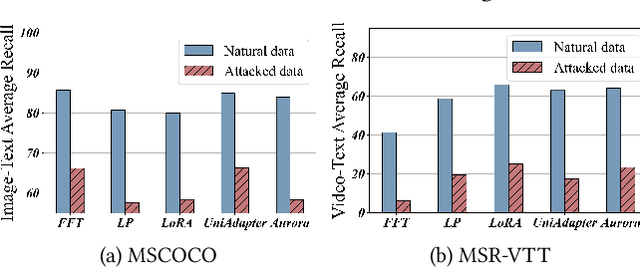Xingwei Zhang
Alleviating Performance Disparity in Adversarial Spatiotemporal Graph Learning Under Zero-Inflated Distribution
Apr 01, 2025Abstract:Spatiotemporal Graph Learning (SGL) under Zero-Inflated Distribution (ZID) is crucial for urban risk management tasks, including crime prediction and traffic accident profiling. However, SGL models are vulnerable to adversarial attacks, compromising their practical utility. While adversarial training (AT) has been widely used to bolster model robustness, our study finds that traditional AT exacerbates performance disparities between majority and minority classes under ZID, potentially leading to irreparable losses due to underreporting critical risk events. In this paper, we first demonstrate the smaller top-k gradients and lower separability of minority class are key factors contributing to this disparity. To address these issues, we propose MinGRE, a framework for Minority Class Gradients and Representations Enhancement. MinGRE employs a multi-dimensional attention mechanism to reweight spatiotemporal gradients, minimizing the gradient distribution discrepancies across classes. Additionally, we introduce an uncertainty-guided contrastive loss to improve the inter-class separability and intra-class compactness of minority representations with higher uncertainty. Extensive experiments demonstrate that the MinGRE framework not only significantly reduces the performance disparity across classes but also achieves enhanced robustness compared to existing baselines. These findings underscore the potential of our method in fostering the development of more equitable and robust models.
AdvLoRA: Adversarial Low-Rank Adaptation of Vision-Language Models
Apr 20, 2024



Abstract:Vision-Language Models (VLMs) are a significant technique for Artificial General Intelligence (AGI). With the fast growth of AGI, the security problem become one of the most important challenges for VLMs. In this paper, through extensive experiments, we demonstrate the vulnerability of the conventional adaptation methods for VLMs, which may bring significant security risks. In addition, as the size of the VLMs increases, performing conventional adversarial adaptation techniques on VLMs results in high computational costs. To solve these problems, we propose a parameter-efficient \underline{Adv}ersarial adaptation method named \underline{AdvLoRA} by \underline{Lo}w-\underline{R}ank \underline{A}daptation. At first, we investigate and reveal the intrinsic low-rank property during the adversarial adaptation for VLMs. Different from LoRA, we improve the efficiency and robustness of adversarial adaptation by designing a novel reparameterizing method based on parameter clustering and parameter alignment. In addition, an adaptive parameter update strategy is proposed to further improve the robustness. By these settings, our proposed AdvLoRA alleviates the model security and high resource waste problems. Extensive experiments demonstrate the effectiveness and efficiency of the AdvLoRA.
 Add to Chrome
Add to Chrome Add to Firefox
Add to Firefox Add to Edge
Add to Edge